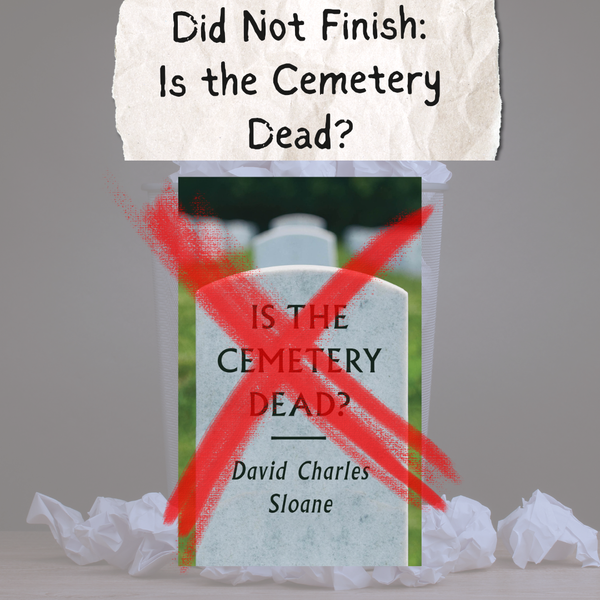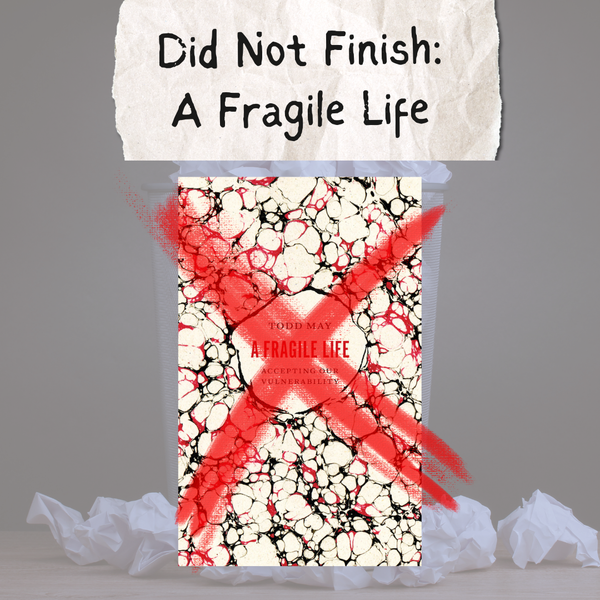Highlighted: Nazaré
A (sort of) book review.

Hi! I'm Matt Wolfbridge and this is Abridged Thoughts, a newsletter about books, literature, writing, the internet, and typewriters.
As much as I enjoy book reviews, sometimes it's hard to capture a novel's unique character from reading a few paragraphs about structure and plot.
What about the words? What about the tone? What about the parts that makeup the whole?
Enter Highlighted, a new series here on Abridged Thoughts.
Every time I finish a work of longform fiction, I'll be posting and discussing select passages I highlighted–from the momentous to the miniscule.
Our inaugural book is Nazaré by JJ Amaworo Wilson. A brief disclosure: I studied under Wilson for several months during my MFA program.
The Story
For the quotes to mean anything, you'll need some context.
I think it's most accurate to call Nazaré a magical realist political fable.
The novel's setting—the fictional city of Balaal—is the kind of place where characters transform into animals (and back), a single magic rain drop can kill someone, and ancient turtles march along armed revolutionaries. The closest thing I've encountered in my own reading is Isabel Allende's The House of the Spirits.
The story begins with a street urchin named Kin unknowingly summoning a mythical gargantuan wave—the titular Nazaré—to return a beached whale to the ocean.
The boy's sorcerous deed attracts the attention of Mayor Matanza—the city's despotic ruler. Matanza, fearful of Kin's supposed powers, sends Balaal's secret police after Kin. He escapes with help from a widow and accused witch named Jesa.
The novel unfolds briskly, with Kin and Jesa visiting locales both humble and hallowed like a city made of junk and monastery with a talking oil painting.
Kin and Jesa traverse Balaal to raise a revolution against Matanza's regime. They recruit animals, acrobats, nuns, monks, miners, and mountain guerillas on their journey. Ultimately, they succeed. Matanza is deposed and Balaal is saved.
The Highlights
Time for the passages I highlighted. We'll start, of course, from the beginning of the novel...
Jesa wore kohl around her eyes. It was her one acquiescence to vanity, to the things of the earth. (Page 23)
I love the phrasing "acquiescence to vanity." It makes Jesa's choice of cosmetics more interesting and reveals aspects of her character. To me, it suggests she's somewhat conflicted. There's an innate vanity that she's strong enough to just give an inch to rather than a mile.
The word choice reminded me of George Saunders' short story Sticks. There's a line in the story reading "the pole was Dad's only concession to glee." Again, it's an excellent use of word choice to convey a deeper meaning about the character.
With barely a pause, an ancient turtle named Abacaxi was led in on a leash to serve as the replacement judge. It didn't matter that the turtle was deaf as a jackhammer and had no notion of the law; it was an elder. In Balaal, those who lived beyond sixty were revered. The turtle was two hundred and twelve. (Page 24)
This moment comes early on in the novel. Mayor Matanza's corrupt government has accused Kin of witchcraft for assisting the beached whale. At a show trial, the judge (who is the Mayor's elderly grand-relative) falls asleep, ushering the bailiffs to wheel in the backup judge: an ancient turtle.
Reading this paragraph showed me the kind of novel this was going to be: weird, mystical, and also a little funny.
Balaal's secret police, the Tonto Macoute, were useless at finding such things as criminals, but they were long-established upturners. They were experts at upturning wardrobes, cupboards, chests of drawers, offices, whole houses. When they really put their backs to it, they could upturn the contents of entire mansions in minutes. They were highly experienced ransackers, possessors of advanced degrees in vandalization and berserker pillaging. They were led by a man called The Butcher, who was the mayor's brother. Between the butchery and the mayory, the citizens of Balaal were, for the most part, kept very quiet. (Page 40)
Wilson found a way to convey the thuggish corruption of secret police forces with humor.
And as The Butcher's car wound its way down the cobbled streets he observed his men roving through the village, battering and whacking away at doors, hurling cutlery and plates, pinning these dumb fishermen against the walls, and he looked on approvingly and thought lovingly of his father, instigator of the Night of the Sixteen Daggers, and his grandfather, the very first Butcher responsible for law and order (and a few unfortunate massacres) in twenty provinces of Balaal, and his uncles, outstanding police captains bemedaled and enriched by their hard work, and his brother, the mayor, the tycoon with a twirling cane, who was perhaps a bit soft for this work, who perhaps preferred not to dirty his hands but who had a thousand men at his command and his six loving dogs yapping at his feet to the sound of his fancy clock collection chiming the hours away. Family was family. (Page 44)
The first sentence of this quote is 150 words. To me, there's a deliberate point in making the reader breathless here. It's to emphasize the continued history of atrocities in this fictional nation. The sentence, like the horrors of Balaal, persists without interruption.
In a more overt way, the passage is of course showing how oppressors are never horrified by what they do. In fact, they love every minute of it!
The men looked at one another. They knew only two languages: Smash and Grab. (Page 51)
The Butcher employs a jungle witch known as The Anteater to track down Kin when he flees to a deserted island.
But there's one problem. The Anteater doesn't speak the language of The Butcher's men. When she tries to warn them about an incoming tidal wave (as well as Kin's whereabouts), they don't understand.
The quote, to me, touches on the fundamental incuriosity of people drawn to bootlicking.
In those early days, music was in the sweat of the people and in their DNA. It was in the hairs on their arms and the buds on their tongues. Music was in their inner organs—their lungs and hearts, kidneys and intestines. A string of notes could conjure the flight of a parrot. A chord progression could invoke the birth of the world or the day when six hundred workers were gunned down in the streets or the end of the first plague when Shashuunan the Prophet flew down from his mountain and announced the End of Death.
And thus when Kin das Ondas brought Shadrak's skiff to the dock, its engine sounded a low C and the birds overhead heard it and began to sing an aria so exquisite it melted the clouds. (Page 62)
Wow. Reading this one again, it feels almost Homeric.
Yeah, I could try to parse out deeper meaning in this passage. But why not just appreciate its beauty?
Balaal's outcasts traditionally ran for the hills. Up there lived witches and shamans. All around them were beasts that had succumbed to genetic mutation and were neither this nor that—rats with lions' claws, pigs interbred with tapirs, feathered bats that sang like starlings. It was rough terrain, alien territory. There were invisible pathways that appeared magically out of dense thicket. There were canyons as wide as seas and valleys where the stones sang.
The hills were cactus territory. Great bulbous heads of it, spines like daggers. They sprang out of the earth like death itself, in all shapes and forms: cylinders, spears, globes.
A man could walk for weeks and swear he had not moved. Hills appeared and reappeared. Streams would dry up and suddenly re-form somewhere else. While Balaal was always on the verge of a terrible burning or drowning, an extinction, the hills would be there forever. They were indomitable as gods. In fact, the people of Balaal said the hills were gods. (Page 78-79)
I highlighted quite a few passages that utilized gorgeous prose to explain the bizarre, transient nature of Balaal. This one was probably my favorite.
In Balaal, they say that every village has its idiot, but, according to legend, Bujiganga had only idiots. Or at least a majority. The one doctor in town howled at the moon every night. The barber brushed his hair with the skeleton of a trout. They said the place was run by a cabal of monkeys who lived in a bus shelter. (Page 82)
I quite liked this little injection of humor that comes when Jesa visits the village of Bujiganga.
Now, onto the next...
He had never been religious, but now he found himself bowing before stones. He saw heaven in the ridges of the ammonite. He discovered a crack in the cave's ceiling, which let in the light, a crevice the thickness of a finger, and he stared at it for hours. He began to think of it as a God, until in the dullness, in the silence of this blackened cave, he told himself either God is dead or I am. But he was alive. Unbeknown to him, he turned fifteen in that cave, although he might have been fifteen thousand, because he lived as the earliest men had lived: in fear and with a certainty that there would be a tomorrow to wake up to. (Page 97)
I highlighted this passage because I thought it was a great encapsulation of Kin's mental breakdown as he spends days trapped in a cave while lost in the wilderness.
Despite a number of unfortunate massacres, public executions, and assassinations of critics, the mayor frequently expressed his desire for an open, free society. (Page 111)
Isn't this always the case? Hah hah hah.
The guards, one in front of Kin and one behind, led him past a line of identical cells. Men lay or sat in a litany of poses, tortured and lugubrious, like some medieval fresco of hell. (Page 139)
First of all, I'm a sucker for a rich vocabulary.
Second, I'm also a sucker for apocalyptic medieval artwork. I have a print of Pieter Bruegel the Elder's The Triumph of Death hanging on my wall. Given my affinity for such works, the dark prison came alive in my mind thanks to Wilson's language.
Because once you've seen gold it remains in your eye like a fleck of dust. (Page 164)
Oof.
In this line, Kin is reflecting on impoverished gold miners he meets. He's wondering why they kept working the mines despite the horrifying conditions and, through meditation, answers his own question.
"No!" said Matanza. "My family kept you safe."
But even as he said the word, a strange high-pitched sound came out of the ether. At first it was indistinct, a wind instrument heard through water. Then it revealed itself: the sound of a woman screaming. The people in the warehouse turned their heads in panic. Where was the noise coming from? Then cries of help rent the air and the sounds of battering, the warp and whoosh of flames, buildings set alight, the cracking of roof beams. Old ransackings. Shouts from the Night of the Sixteen Daggers. Cries from the Slepvak Massacre. The volume rose, some kind of collective memory as all the sins of the regime sounded there in that warehouse-courthouse. It was a recording made and played by the universe, an echo of hell on earth that resounded through time, that was now in the very pores and creases of Balaal—in every building, in every ditch, in every godforsaken pueblo where the regime had ruled. The panic turned to wonder. The music of mayhem was playing in their ears, turning Matanza's pleas to dust. (Page 233-234)
Harrowing.
This passage comes after the rebel forces capture Matanza and put him on trial. For me, the key phrase is "a recording made and played by the universe, an echo of hell on earth that resounded through time."
I have a pessimistic view of humanity. The brutality depicted in Wilson's novel, while fictional, is obviously based on real life strongmen and despots that have existed throughout human history. Exploitation, immiseration, oppression, and extermination seem to be innately human forces.
Above all, he was listening for an echo—the echo of the breath that heralded the birth of the universe. It was out there somewhere among all the dead stars. (Page 248)
Back in college, and for a time afterward, I was deeply into what I called cosmic splendor. Think half euphoric and half philosophy 101. I'd wax poetic about the grandiose nature of the universe and its mysteries.
I am still a non-spiritual atheist but the universe's grand scale doesn't fill me with awe anymore. No matter how cool space might be, I still have to die and my consciousness will erased from existence.
But were I a Dr. Manhattan-like super-being, I'd do something similar to what's described in the quote: tap into the very origins of the cosmos.
"Love and honor this world, for you have known no other, and remember: everything begins and ends in the sea." (Page 249)
These are the final words Kin hears from his priestly mentor.
If only we lived in a world designed to make honoring it easy. Oh well!
Final Thoughts
Anyone who loves myth, magical realism, or lyrical prose should read JJ Amaworo Wilson's Nazaré. It's a far from intimidating read, and I was able to finish it in under a week.




